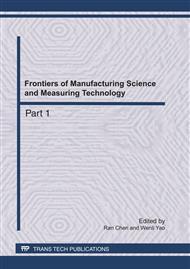[1]
Kralj D.,: Environmental Waste Management in Constructions Lecture Notes on Energy and Environment, WSEAS 07, Archanchon, France, Oct. (2007).
Google Scholar
[2]
Kralj, D., Markič, M. (2008) Building materials reuse and recycle. WSEAS transactions on environment and development, 2008, vol. 4, iss. 5, pp.409-418.
Google Scholar
[3]
Woolfe, L. (2002) Leadership secrets from the Bible, MJF Books, New York, NY.
Google Scholar
[4]
Gottfredson, M. and Scaubert, S. ( 2008), The breakthrough imperative; how the best managers get outstanding results. Bain & Company, Inc., New York, NY.
Google Scholar
[5]
Shenhar, A. J and Dvir., D: (2007), Reimventing Project Management; The diamond approach to successful growth and innovation, HBS Press, Boston, MA.
Google Scholar
[6]
Drucker, P.F. (2006), Classic Druckre, HBS Press, 2006 p.77.
Google Scholar
[7]
Kotter, J.P. (1996), Leading Change, HBS, Boston, MA.
Google Scholar
[8]
Hart, S.L. (2007), Beyond Greening: Strategies for a Sustainable World, Harvard Business Review on Green Business Strategy, HBS Press, Boston, MA.
Google Scholar
[9]
Kralj, D., Ogrin, U., Krope, J., (2005), Environment protection culture as a part of innovating of management in construction industry. WSEAS transactions on environment and development, vol. 1, iss. 2.
Google Scholar
[10]
Wright T. (2004) A Selected Viewpoint on " Systems Thinking and Climate Change System, Cambridge.
Google Scholar
[11]
Kralj, D.: Dialectal system approach supporting environmental innovation for sustainable development. Kybernetes, 2008, let. 37, št. 9/10, pp.1542-1560.
DOI: 10.1108/03684920810907850
Google Scholar
[12]
ISO 14062: 2002(E) Environmental management- Integrating environmental aspects to product design and development, ISO (2002).
Google Scholar
[13]
Song, Z., Kralj, D.: Teaching for Sustainable Development, Recent advances in circuits, systems and signal: international conference on circuits, systems, signal (CSS), Malta, September 15-17, 2010, (International Conference on Circuits, Systems and Signals – Proceedings). [S. l. ]: WSEAS Press, cop. 2010, p. pp.197-203.
Google Scholar


